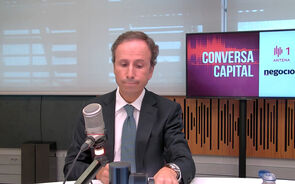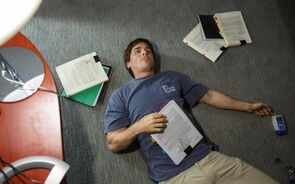Eurozone 'enters recession' for first time
3 mensagens
|Página 1 de 1
Yep
Two years on and the EU is dangerously close to being pushed into recession again especially with the situation in Ireland and Greece, it could be a gloomy Xmas. America is also having to inject more money as well which is not a good sign. The next 6 months are going to be turbulent.
- Mensagens: 1
- Registado: 18/11/2010 18:24
- Localização: 11
Nisso podemos dar-lhes umas lições, já estamos habituados.
Portugal housing bust holds lesson for Spain
LISBON, Sept 10 (Reuters) - If Portugal's five-year-old property bust is anything to go by, neighbouring Spain could be in for a long wait for its housing market to recover. Portugal entered its property downturn when the good times inspired by its admission to the euro bloc were quashed by a budget deficit that forced sharp cuts in government spending and sapped confidence. Although property didn't start the downturn, Portugal's economic performance has been paltry ever since its real estate market ran into trouble and economists fear the same or worse in Spain, which also has to contend with the year-old global credit crunch. "Spain is in a very similar situation now to where we were in 2003," said Teresa Pinheiro, an analyst at Portugal's BPI bank. "But our house prices hadn't risen as much as in Spain, so it may have a bigger correction." While Spain's property market is four times larger than Portugal's, the booms in both countries had similarities in that coastal tourist regions led property prices higher nationwide. Since 2003 Portugal's house prices have clocked up gains that have barely kept up with inflation, although larger gains have taken place in areas such as downtown Lisbon and the Algarve tourist region. "House prices here have stood still for five years," said Jorge Oliveira, communications director for the country's association of construction companies.
"We had the crisis five years earlier than Spain." Portugal's property boom in the run-up to the bust was not exactly like Spain's, but it was certainly fed by similar conditions -- easy credit, then caused by falling interest rates in the run-up to the introduction of the euro in 2002. The ensuing downturn, which put Portugal near or at the bottom of most European growth tables in recent years, was in no small part caused by the disappearance of construction as a fundamental motor of economic growth.
CONSTRUCTION DOWNTURN
Portuguese construction slumped 10.8 percent in 2003 and has gone on declining. It went from representing a high of 14 percent of Portugal's economic output to around 10 percent now. That's a grim example for Spain, where the construction industry represented about 18 percent of economic output before the crisis hit early this year. Oliveira said Portugal's experience showed the overhang of unsold housing stock puts a drag on prices for years to come. In Portugal, only recently have there been indications that builders are considering new investments. "We have seen a slow initiation of plans to carry out new projects to be completed in 2010," Oliveira said, adding that Spain still has new building projects, which typically take 36 months to complete. "The property market has an inertia that can't be countered." Until recently, Portugal still had new houses and apartments that had been on the market since the construction boom of the early 2000s, housing experts said. Carlos Andrade, chief economist at Espirito Santo Research, says Spain, like Portugal, will find it hard to free its economy from over-reliance on housing and construction. "Spain will have to change its patterns of growth, as Portugal has had to do," Andrade said. "It will have to find other sources of growth; there will have to be a long, hard process of structural adjustment in the economy." Luis Antunes, a partner at real estate consultant Cushman & Wakefield in Lisbon, said that kind of restructuring by Portuguese building firms has included diversifying into other markets such as energy and construction in emerging economies. While Spain's property boom extended further than Portugal's and could therefore require a sharper price correction, economists note Spain also has economic advantages -- notably a comfortable budget surplus going into the crisis. "In Portugal there were high public and private debt levels: in Spain only private debt is high," said Pinheiro. The global credit crunch means Portugal's property market has weakened more in 2008 than in previous years -- although this may finally clear out the housing stock overhang. "The only advantage we have is that we have already suffered and have a lot less far to fall," said Antunes.
As pessoas são tão ingénuas e tão agarradas aos seus interesses imediatos que um vigarista hábil consegue sempre que um grande número delas se deixe enganar.
Niccolò Machiavelli
http://www.facebook.com/atomez
Niccolò Machiavelli
http://www.facebook.com/atomez
Eurozone 'enters recession' for first time
Fonte é a cnn
(CNN) -- The 15 countries that share the single European currency are in recession for the first time in the 10-year history of the eurozone, according to initial estimates the European Union said Friday.
According to the latest EU figures, GDP fell 0.2% in the third quarter, the second successive quarter of negative growth.
The news comes a day after Germany -- Europe's biggest economy -- announced it had dropped into recession territory.
With the UK expected to follow suit, France is the only one of Europe's biggest three economies to expand in the third quarter, with figures showing it had grown by 0.1 percent between June and September. The UK is not part of the eurozone.
There was further economic misery in the U.S. as well Friday as beleagurered mortgage lender Freddie Mac reported a $25 billion third-quarter loss that will force it to start tapping into the $100 billion in taxpayer money set aside for its bailout by the U.S. Treasury.
The Treasury took control of Freddie Mac and Fannie Mae, the U.S.'s other mortgage finance giant, in September when it became clear that rising losses on bad mortgages would cause them to run out of capital.
California-based software and computer networking giant Sun Microsystems also became the latest company to slash its workforce, announcing that it will cut 6,000 jobs, or 18 percent of staff, as part of cost-cutting measures.
Meanwhile U.S. retail figures for October suffered the worst monthly drop on record -- down 2.8 percent --and the fourth consecutive decline in monthly retail sales, according to the Commerce Department.
"These numbers reinforce the fact that we are in a recession," Michael Niemira, chief retail economist with the International Council of Shopping Centers (ICSC), told CNNMoney.
Elsewhere, there was more bad news in the British banking sector, as Royal Bank of Scotland announced plans to slash around 3,000 jobs worldwide over the next several weeks to reduce costs, according to British media reports. Watch more about the global economic crisis »
On Wall Street U.S. markets slumped Friday, following wild swings in the previous session that saw the Dow Jones slip to within 81 points of its 5-1/2-year low before surging late to finish up more than 6.7 percent, or more than 550 points.
According to early closing tallies, the Dow Jones industrial average fell 338 points, or 3.8 percent. The Standard & Poor's 500 index fell 4.1 percent and the Nasdaq composite shed 5 percent.
In Europe, major markets in London, Paris and Frankfurt slipped back a little in late afternoon trading but remained in positive territory.
Asian and Pacific markets posted modest gains with Japan's Nikkei index closed up 2.7 percent, Hong Kong's Hang Seng index was was up 2.43 percent and Australia's All Ordinaries index rose 1.46 percent by close of play.
Stocks tumbled each day this week and through early Thursday afternoon. But the sell-off left the major gauges at levels that many market pros think could represent a bear market bottom, at least in the near term.
"As soon as the Dow fell below 8,000, we saw a rush of buying," said Matt King, chief investment adviser at Bell Investment Advisers.
It was the second time the market retested those lows, which were first hit around October 10. The major gauges slumped to around those levels at the end of October and again in mid-November.
"It was very positive," King said. "It seems like we have put a bottom in place."
However, he said there was a possibility that the market could rally for a few months and then retest again. If so, that would be similar to what happened when the last bear market bottomed in 2002 and 2003.
In further sign that a global recession is starting to take hold, China announced that its powerhouse manufacturing sector slowed in October.
China's industrial output grew 8.2 percent in October compared to year-ago levels -- a decline in growth of 3.2 percent from September, the National Bureau of Statistics reported
3 mensagens
|Página 1 de 1
Quem está ligado:
Utilizadores a ver este Fórum: Google [Bot] e 49 visitantes



